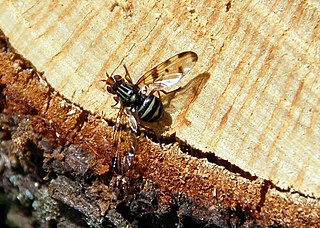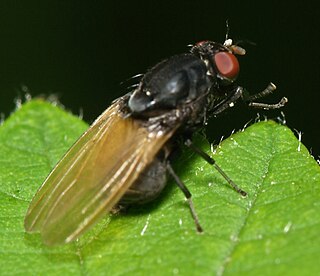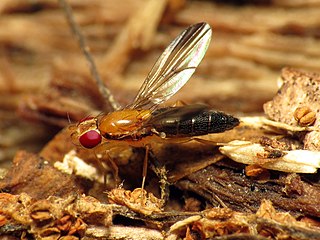Related Research Articles

The Ulidiidae or picture-winged flies are a large and diverse cosmopolitan family of flies (Diptera), and as in related families, most species are herbivorous or detritivorous. They are often known as picture-winged flies, along with members of other families in the superfamily Tephritoidea that have patterns of bands or spots on the wings. Some species share with the Tephritidae an unusual elongated posteroapical projection of the anal cell in the wing, but can be differentiated by the smoothly curving subcostal vein. Two species, Tetanops myopaeformis and Euxesta stigmatias, are agricultural pests.

Opomyzidae is a family of acalyptrate Diptera. They are generally small, slender, yellow, brown or black coloured flies. The larval food plants are grasses, including cereal crops, the adults are mainly found in open habitats. Some species being agricultural pests.

Diastatidae are a family of flies, and are in the order Diptera. They occur primarily in the Holarctic Region, but several species are known from the Oriental, Neotropical, and Australasian regions. Members of the family number over 20 described species in three genera. There is an additional fossil genus.

Otites is a genus of picture-winged fly in the family Ulidiidae.

Herina is a genus of flies in the family Ulidiidae. It is possibly the largest genus in the family.

Bibio, March flies or St. Mark's flies, is a genus of flies (Diptera).

Minettia is a genus of small flies of the family Lauxaniidae. They have almost worldwide distribution, is one of the most species rich genera of the family with more than 120 described species. The Palaearctic is the most diverse with some 56 described species. The genus is divided into 3 subgenera.

Suillia is a genus of flies in the family Heleomyzidae. There are at least 130 described species in Suillia.
Euthychaeta is a genus of flies in the Diastatidae family.

Chamaemyia is a genus of flies in the family Chamaemyiidae. It is the type genus of its family.
Ortalis is an historic genus of Ulidiid or picture-winged flies, first described by Fallén in 1810. It served as the type genus for the family Ulidiidae, which was called Ortalidae at the time. In 1932, it was pointed out by Adlrich that the name Ortalis was preoccupied by a genus of birds which had been named by Merrem in 1786. The name of the fly family was therefore revised, with some authors calling it Otitidae until Ulidiidae was settled on as standard. The genus itself was found to be paraphyletic, and all of its species have been reassigned to other genera, some in the Ulidiidae, and some in other Tephritoid families. In the following list, the species are organized according to the families and genera to which they have been reassigned.

Tetanocera is a genus of marsh flies, insects in the family Sciomyzidae. There are at least 50 described species in Tetanocera.

Geomyza is a genus of flies in the family Opomyzidae. There are at least 30 described species in Geomyza.

Clusiodes is a genus of flies in the family Clusiidae. There are at least 70 described species in Clusiodes.

Cordilura is a genus of dung flies in the family Scathophagidae. There are more than 90 described species in Cordilura.

Scoliocentra is a genus of flies in the family Heleomyzidae. There are at least 40 described species in Scoliocentra.

Diadocidia is a genus of fungus gnats in the family Diadocidiidae.
References
- ↑ Papp, T. (1984). "Diastatidae". In Árpád Soós, Papp T. (ed.). Catalogue of Palaearctic Diptera (print). Vol. 10. Amsterdam: Elservier. pp. 182–185. ISBN 0-444-99601-X.